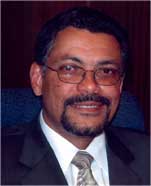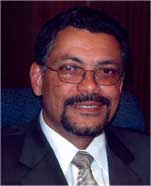 KINGSTON, R.I. — April 9, 2012 — John Ramos, former director of minority student affairs and former graduate student at the University of Rhode Island, has spent his career trying to narrow the achievement gap between majority students and students of color.
KINGSTON, R.I. — April 9, 2012 — John Ramos, former director of minority student affairs and former graduate student at the University of Rhode Island, has spent his career trying to narrow the achievement gap between majority students and students of color.
On Tuesday, the University will honor him for his tireless work.
Ramos is the recipient of the 2012 Diversity Award for Lifetime Achievement, which he will receive Tuesday at the URI Diversity Awards Banquet. The event will be held from 6 to 8:30 p.m. in the Memorial Union Ballroom.
The awards are presented by the Multicultural Center, The Office of Community, Equity and Diversity and the Office of Affirmative Action, Equal Opportunity and Diversity.
“I was blown away. That’s the best way to put it,” Ramos said. “I’m deeply honored by it. I feel humbled by it. I’m sure there are many people who would deserve it before me.”
Humility aside, there is no denying the contributions Ramos has made to elevating student achievement in several school districts across Connecticut.
As Superintendent of the Bridgeport Public School District from 2005 to 2011, Ramos introduced data-based teaching and students there registered noteworthy gains, outperforming their peers of similar race and family income levels around the state. Students improved proficiency scores in reading, writing and math and suspension rates went down.
While serving as principal at Norwalk High School from 1989-2000, Ramos prepared a report describing the achievement gap and proposed a strategy to narrow it. The report was published in Principal Leadership in April 2002.
“Through strategic planning, we have tried to develop a mission that is clear to all the stakeholders for students’ academic success in the community,” Ramos said. “It’s not just a mission statement, goals, objectives and activities that sit on a shelf somewhere. It’s developed by the stakeholders in the community.”
In addition to his time in Bridgeport and Norwalk, Ramos served as Superintendent of Watertown Public Schools from 2002 to 2004. He also was deputy commissioner for educational programs and services in the Connecticut Department of Education in 2002 and assistant superintendent for curriculum and instruction in Norwalk Public Schools from 2000-2002.
During his decades of work, he said that while academic failure of students is often attributed to parents who are not involved with their children’s education, it actually was not difficult to get parents in the communities he served to join the process.
“Going back to my work on the achievement gap study in Norwalk, there is no shortage of opinions,” he said. “Many people want to have a voice in the process, so no, it’s not difficult to engage people. They just need to be asked.
“The rap on parents is that they’re not engaged,” he said. “Yes, it’s hard sometimes for them to get to meetings because of two or three jobs they may be working. When you invite them to meetings that involve student work and exhibitions, you’re more apt to get parents out.”
Part of the responsibility lies with school districts, Ramos said, to reach out to parents more and make it easier for them to stay involved with their children’s schoolwork.
“As the enterprise of teaching students grows and adapts, we have to do more to meet parents where they are,” Ramos said. “A lot of people don’t go to banks during business hours anymore, they use ATMs or online banking. We have to use technology to be more available to parents.”
Ramos also said school districts need to spend more time reinforcing students’ strengths, giving them the confidence they need to achieve and perform well in school. Testing policies based on No Child Left Behind that focus on meeting minimum standards tend to hone in on students’ weaknesses, he said, and that leaves them feeling frustrated.
“Focusing on their strengths can make a difference in how they self-actualize and become confident and competent in their skills to move on with their lives,” he said.
Ramos said his time at URI as both a graduate student (he earned a master of public administration in 1987) and as director of minority student affairs (1982-83) helped him identify problems facing students of color and ways he could affect change at an institutional level.
“Whether it was creating orientation materials for all students or working on programs designed to increase the number of students of color on campus, all of that work helped to mold me and develop my skill set,” Ramos said. “I learned where and how to affect an institution from the inside.
“Having the opportunity to earn my master of public administration degree allowed me to verify some of what I thought I knew or to learn more about how to do the work of improving educational institutions through the political lens or through the human development lens,” he continued. “It helped me codify some of the strategies and other skill sets I had going into the experience.”
In addition to Ramos’ Lifetime Achievement Award, the program will present awards for: Undergraduate Student Excellence (Arts & Culture); Undergraduate Student Excellence (Academics & Service); Undergraduate Student Excellence; Student Organization Excellence (Leadership & Service); Graduate Student Excellence (Leadership & Service) and Staff/Administrator Excellence (Leadership & Service); Faculty Excellence (Leadership & Service)
For more information on the program or the awards, contact Mailee Kue, assistant director of Multicultural Student Services, at (401) 874-5829.

